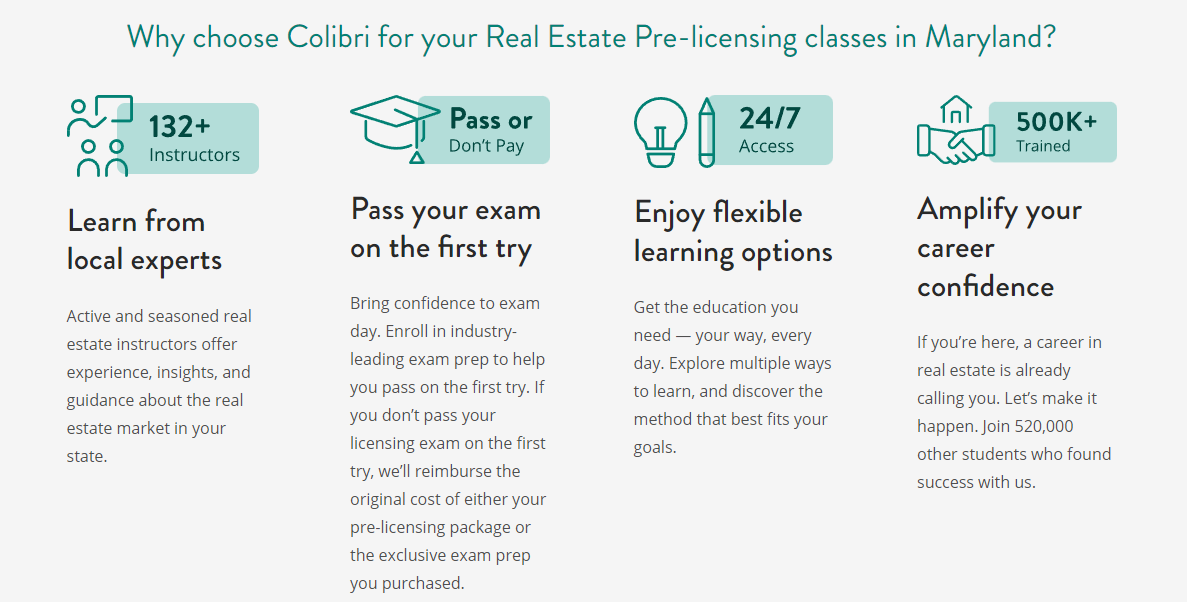Ready to get your Maryland real estate license? Whether cruising along the Chesapeake or setting your sights on the Baltimore skyline, becoming a licensed agent in Maryland is your golden ticket to making some serious moves. Don’t worry; it will be as fun as catching a crab feast on the Eastern Shore. In just six easy steps, you’ll learn how to become a real estate agent in Maryland and make Old Bay–seasoned waves in real estate!
Quick Facts & Costs for Maryland Licensees








Types of Licensees in Maryland & How Much They Earn
- Salesperson (salary range: $55,000 to $75,000): They work under the supervision of a licensed real estate broker and help clients buy, sell, or rent property.
- Associate broker (salary range: $75,000 to $100,000): These are individuals who qualify to become brokers but prefer to work under another broker’s supervision rather than managing their own brokerage.
- Broker (salary range: $75,000 to $125,000 or more):Brokers operate independently from a firm or even start their own real estate firms.
Step-by-Step Breakdown: How to Become a Real Estate Agent in Maryland
Step 1: Meet Maryland Legal Requirements
To be eligible for a Maryland realtor license, you need to:
- Be at least 18 years old
- Satisfy the commission that you possess good character and reputation
- Meet any other requirement that the Maryland Real Estate Commission (MREC) deems necessary
Did you know? Maryland has reciprocity agreements with Oklahoma and Pennsylvania. This means agents already licensed in these states don’t have to take MREC’s prelicensing courses or exams but must pass the background check and submit the Original Reciprocal Form to earn their license.
Also, Maryland is a cooperative state in terms of portability. It allows out-of-state real estate agents or brokers to physically enter Maryland to conduct real estate business. However, out-of-state agents must have a co-brokerage agreement with a licensee in Maryland to work on a real estate transaction.
Step 2: Choose a Maryland Real Estate School for Prelicensing Education
-
Cost: $200 to $500
-
Time commitment:: 3 to 6 weeks depending on course format and pace
-
Helpful resource: Best Real Estate Schools in Maryland
Choosing the right Maryland real estate school for your prelicensing course is the first step toward getting your real estate license. In your real estate prelicensing classes for MD, you’ll learn key topics like real estate laws, contracts, property ownership, and ethical practices to prepare for the exam. You’ll need to complete 60 hours of coursework, so picking a school that fits your schedule and learning style is important.

Colibri Real Estate offers state-approved prelicensing courses specifically designed for aspiring Maryland real estate agents. With flexible online options and comprehensive materials, Colibri helps you meet Maryland’s 60-hour education requirement from anywhere while also preparing you for the state licensing exam.
Step 3: Pass the Maryland Real Estate License Exam
-
Cost: $44 per attempt
-
Time commitment:: 120 minutes
-
Helpful resource: 7 Hacks to Help You Ace Your Real Estate Exam and Maryland Candidate Information Bulletin
| Test Format and Number of Questions | Multiple-choice format and 110 total questions |
| Where to Register for Exam | PSI exams |
| Items to Bring to Testing Center | |
| Passing Grade | 70% or higher |
Once you’ve completed your prelicensing education, your real estate school will send your certificate to PSI, the company that administers the Maryland real estate exam. After they receive your information, you’ll get an email with instructions on creating an account and scheduling your exam. The exam fee is $44, which you can pay online using a credit or debit card. If you don’t pass the Maryland real estate exam on your first try, don’t worry—you can retake it! Just keep in mind that you’ll need to pay the exam fee for each attempt.
Step 4: Apply for a Maryland Real Estate License
-
Cost: $90
-
Time commitment:: 1 hour or less
-
Helpful resource: Maryland Real Estate Commission (MREC)
Once you’ve successfully passed the Maryland real estate exam, the next step is to apply for your real estate license. Submit your application online through the Maryland Real Estate Commission’s platform. The application fee is $90, and you must apply within one year of passing the exam to remain eligible.
The Maryland Real Estate Commission also requires applicants to demonstrate “good character and reputation.” Part of the application process involves a background check. While having a criminal record, such as a misdemeanor or felony, doesn’t automatically disqualify you, the commission considers all the circumstances of each case before making a final decision on granting the license.
Step 5: Join a Real Estate Brokerage
The final step in becoming a real estate agent in Maryland is to join a brokerage. When selecting one, be sure to ask about commission splits, as they can vary—some offer a 50-50 split, while others provide a higher cut in exchange for fees. You’ll also want to understand the brokerage’s “cap,” which limits how much they take from your commissions each year. Keep in mind that, as a commissioned salesperson, your income depends entirely on how much you sell, what type of sales agent you will be, and whether you start part-time to ease into the business.
Start looking for brokerages in the areas you’d like to work in to jump-start your new career. Check out our Best Real Estate Company to Work For in 2024 guide to learn about some of the larger firms.
Step 6: Start a Successful Career in Maryland
Now that you’ve got your license, it’s time to hit the ground running and build a successful real estate career! Here are some tips to help you start your journey as a successful salesperson in Maryland:
- Build a strong network: Networking with other agents, lenders, and industry professionals is super important. Attend local real estate events and connect with mentors who can guide you.
- Develop a marketing strategy: Use social media, create a professional website, and explore digital marketing tools to reach potential clients.
- Stay educated: The market and laws are constantly changing. Keep learning by taking continuing education courses and staying updated with industry news.
- Focus on building solid relationships: Providing excellent customer service is key to building long-term relationships and gaining referrals.
- Manage your time wisely: Time management can make or break your success in real estate. Prioritize tasks and set daily goals to stay on top of your workload.
These steps will set you on the path to success as a new real estate agent!
Frequently Asked Questions (FAQs)
How long does it take to obtain a real estate license in MD?
Getting your real estate license in Maryland typically takes 2 to 3 months. The timeline depends on how quickly you can complete the 60-hour prelicensing course, pass the state exam, and find a sponsoring broker. Some people finish faster if they can dedicate more time to studying, while others take longer if they balance the course with other commitments.
What is the cost to become a Maryland real estate agent?
The total cost to become a real estate agent in Maryland ranges between $500 and $800. This includes the prelicensing course, which typically costs $200 to $500, the $44 exam fee, and a $90 license application fee. Additional costs may include study materials and fees for background checks.
Is it hard to pass the Maryland real estate exam?
The Maryland real estate exam can be challenging, but with the right preparation, it’s definitely doable. You’ll need a 70% score to pass both the national and state sections of the exam. Many candidates find success after taking a solid exam prep course and practice exams.
How much does the average realtor in Maryland make?
The average real estate agent in Maryland makes about $64,500 per year, though this can vary widely based on experience, location, and sales volume. Top-performing agents and those in high-demand areas can earn significantly more.
Back to You
Now that you know the steps to get your real estate license in Maryland, it’s time to make your move. Whether you’re just starting out or looking to take the next step in your career, this journey can be exciting and rewarding. With the right preparation and mindset, you’ll be ready to succeed in no time!











